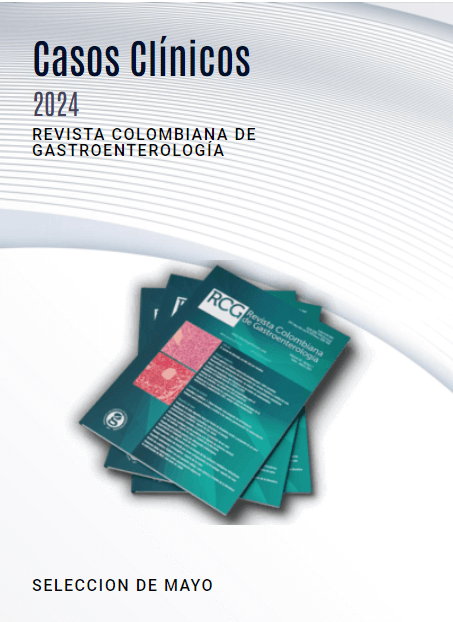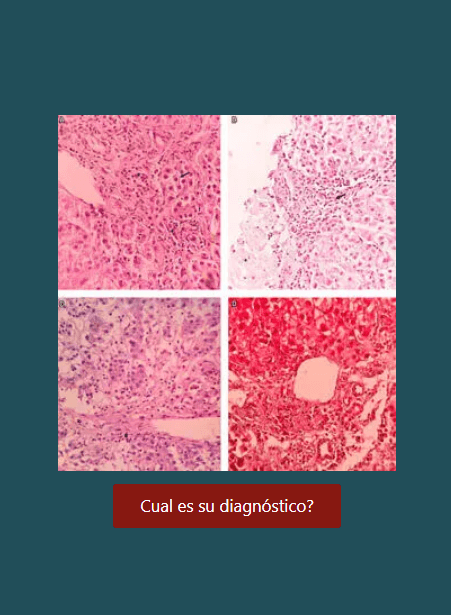Hepatitis aguda recurrente inducida por albendazol
DOI:
https://doi.org/10.22516/25007440.206Palabras clave:
Lesión hepática inducida por medicamentos, albendazol, alanina-aminotransferasaResumen
El albendazol es un medicamento usado para tratar infecciones por helmintos y usualmente presenta pocos o ningún efecto secundario. A pesar de que hay un incremento transitorio de enzimas hepáticas luego de su uso, existe poca evidencia en la literatura en la que se reporte lesión hepática luego de automedicación con albendazol. En este informe, el paciente se presentó con hepatitis aguda luego de automedicarse con albendazol. El paciente cuenta además con una historia de episodios similares después de haber usado el fármaco. Se evaluada la causalidad con el método de evaluación de causalidad de Roussel Uclaf del Concejo para Organizaciones Internacionales de Ciencias Médicas, cuyo resultado fue un puntaje de 10, lo que indicó una alta probabilidad de lesión hepática inducida por albendazol al cabo de realizarse una investigación rigurosa y de excluir otras posibles causas de la condición física del paciente. En conclusión, aunque es ideal agilizar el proceso para combatir a los helmintos, es necesario intensificar la necesidad de monitorizaciones de calidad para evitar reacciones adversas como la hepatitis inducida por medicamentos. Asimismo, la automedicación de cualquier medicamento debe ser siempre evitada.
Descargas
Lenguajes:
esReferencias bibliográficas
Katzung B, Trevor AJ. Basic & clinical pharmacology. Nueva York: McGraw-Hill; 2015.
Dayan AD. Albendazole, mebendazole and praziquantel. Review of non-clinical toxicity and pharmacokinetics. Acta Tropica. 2003;86:141-59. doi: 10.1016/S0001-706X(03)00031-7.
Venkatesan P. Albendazole. J Antimicrob Chemother.
;41:145-7. doi: 10.1093/jac/41.2.145.
Horton J. Albendazole: a review of anthelmintic efficacy and safety in humans. Parasitology. 2001;121:S113. doi: 10.1017/S0031182000007290.
Goodman LS, Brunton LL, Chabner B, Knollmann BC. Goodman & Gilman’s the pharmacological basis of therapeutics. 12.a edición. Nueva York: McGraw-Hill; 2011.
Marin Zuluaga JI, Marin Castro AE, Perez Cadavid JC, Restrepo Gutierrez JC. Albendazole-induced granulomatous hepatitis: a case report. J Med Case Rep. 2013;7:201. doi: 10.1186/1752-1947-7-201.
Choi GY, Yang HW, Cho SH, Kang DW, Go H, Lee WC, et al. Acute drug-induced hepatitis caused by albendazole. J Korean Med Sci. 2008;23:903-5. doi: 10.3346/jkms.2008.23.5.903.
Koca T, Akcam M. Albendazole-induced autoimmune hepatitis. Indian Pediatr. 2015;52:78-9.
Rios D, Restrepo JC. Albendazole-induced liver injury: a case report. Colomb Med (Cali). 2013;44:118-20.
Nandi M, Sarkar S. Albendazole-induced recurrent hepatitis. Indian Pediatr 2013;50:1064. doi: 10.1007/s13312-013-0285-8.
Amoruso C, Fuoti M, Miceli V, Zito E, Celano MR, De Giorgi A, et al. Acute hepatitis as a side effect of albendazole: a pediatric case. Pediatr Med Chir. 2009;31(6):262-4.
Ben Fredj N, Chaabane A, Chadly Z, Ben Fadhel N, Boughattas NA, Aouam K. Albendazole-induced associated acute hepatitis and bicytopenia. Scand J Infect Dis. 2014;46(2):149-51. doi: 10.3109/00365548.2013.835068.
Gozukucuk R, Abci I, Guclu M. Albendazole-induced toxic hepatitis: A case report. The Turkish Journal of Gastroenterology. 2009;24:82-84. doi: 10.4318/tjg.2013.0426.
Shah C, Mahapatra A, Shukla A, Bhatia S. Recurrent acute hepatitis caused by albendazole. Trop Gastroenterol. 2013;34(1):38-9. doi: 10.7869/tg.2012.90.
Dufour DR, Lott JA, Nolte FS, Gretch DR, Koff RS, Seeff LB. Diagnosis and monitoring of hepatic injury. II. Recommendations for use of laboratory tests in screening, diagnosis, and monitoring. Clin Chem. 2000;46(12):2050-68.
Dufour DR, Lott JA, Nolte FS, Gretch DR, Koff RS, Seeff LB. Diagnosis and monitoring of hepatic injury. I. Performance characteristics of laboratory tests. Clin Chem. 2000;46(12):2027-49.
Chalasani N, Fontana RJ, Bonkovsky HL, Watkins PB, Davern T, Serrano J, et al. Causes, clinical features, and outcomes from a prospective study of drug-induced liver injury in the United States. Gastroenterology. 2008;135(6):1924-34, 1934.e1-4. doi: 10.1053/j.gastro.2008.09.011.
Fontana RJ, Seeff LB, Andrade RJ, Björnsson E, Day CP, Serrano J, et al. Standardization of nomenclature and causality assessment in drug-induced liver injury: summary of a clinical research workshop. Hepatology. 2010;52(2):730-42. doi: 10.1002/hep.23696.
Ghabril M, Chalasani N, Bjornsson E. Drug-induced liver injury: a clinical update. Curr Opin Gastroenterol. 2010;26:222-6. doi: 10.1097/MOG.0b013e3283383c7c.
Pawlowski ZS, Schad GA, Stott GJ. Hookworm infection and anaemia: approaches to prevention and control. Génova: World Health Organization; 1991.
Checkley AM, Chiodini PL, Dockrell DH, Bates I, Thwaites GE, Booth HL, et al. Eosinophilia in returning travellers and migrants from the tropics: UK recommendations for investigation and initial management. J Infect. 2010;60(1):1-20. doi: 10.1016/j.jinf.2009.11.003.
Teschke R, Frenzel C, Wolff A, Eickhoff A, Schulze J. Drug induced liver injury: accuracy of diagnosis in published reports. Ann Hepatol. 2014;13(2):248-55.
Danan G, Benichou C. Causality assessment of adverse reactions to drugs--I. A novel method based on the conclusions of international consensus meetings: application to drug-induced liver injuries. J Clin Epidemiol. 1993;46:1323-30. doi: 10.1016/0895-4356(93)90101-6.
Benichou C, Danan G, Flahault A. Causality assessment of adverse reactions to drugs--II. An original model for validation of drug causality assessment methods: case reports with positive rechallenge. J Clin Epidemiol. 1993;46:1331-6.doi: 10.1016/0895-4356(93)90102-7.
Benichou C. Criteria of drug-induced liver disorders. Report of an international consensus meeting. J Hepatol. 1990;11:272-6. doi: 10.1016/0168-8278(90)90124-A.
Farrar J, Hotez PJ, Junghanss T, Kang G, Lalloo D, White N. Manson›s tropical diseases. 23.a edición. Elsevier; 2014.
Morris DL, Dykes PW, Marriner S, Bogan J, Burrows F, Skeene-Smith H, et al. Albendazole--objective evidence of response in human hydatid disease. JAMA. 1985;253(14):2053-7.
Morris DL, Smith PG. Albendazole in hydatid disease--hepatocellular toxicity. Trans R Soc Trop Med Hyg. 1987;81:343-4. doi: 10.1016/0035-9203(87)90259-8.
Bueno GCL, Reis M, Dantas-Corrêa EB, Schiavon LL, Narciso-Schiavon JL. The prevalence of intestinal parasitosis according to gender in a University Hospital in Southern Brazil. Rev Patol Trop. 2015;44(4):441-52. doi: 10.5216/rpt.v44i4.39240.
Descargas
Publicado
Cómo citar
Número
Sección
Licencia
Aquellos autores/as que tengan publicaciones con esta revista, aceptan los términos siguientes:
Los autores/as ceden sus derechos de autor y garantizarán a la revista el derecho de primera publicación de su obra, el cuál estará simultáneamente sujeto a la Licencia de reconocimiento de Creative Commons que permite a terceros compartir la obra siempre que se indique su autor y su primera publicación en esta revista.
Los contenidos están protegidos bajo una licencia de Creative Commons Reconocimiento-NoComercial-SinObraDerivada 4.0 Internacional.

| Estadísticas de artículo | |
|---|---|
| Vistas de resúmenes | |
| Vistas de PDF | |
| Descargas de PDF | |
| Vistas de HTML | |
| Otras vistas | |

















